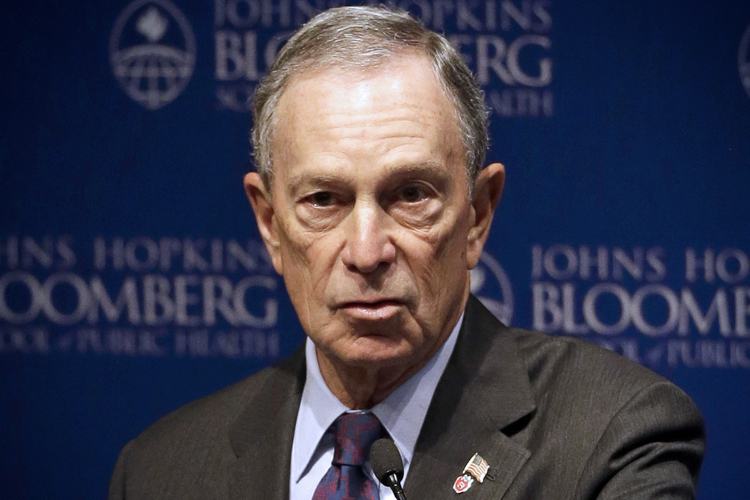Michael Bloomberg likes to portray himself as a moderate, sensible man whose supposed reasonableness contrasts with the partisan sniping that defines most American politics. By putting feelers out for an independent presidential run, however, Bloomberg shows how unreasonable a man he actually is. No reasonable person wants Donald Trump befouling the White House, but if Bloomberg throws his hat into the ring, the possibility of a Trump win rises dramatically.
The blunt fact of the matter is that Bloomberg isn’t going to win. Despite the popularity of declaring yourself an “independent,” most voters are partisans. You might tell a pollster you’re “independent,” but if you voted Republican in the last election, you will most likely do so in this election and the next and the next. (Same is true for Democratic “independents.”)
The only role a third-party candidate can play is that of a spoiler, someone who chips off just enough votes from a major party candidate that he throws the election to the other guy. Ross Perot chipped off enough Republican voters in the ’90s to secure wins for Bill Clinton. Ralph Nader chipped off a smaller percentage of the Democratic electorate in 2000, but he still got enough to throw what should have been an easy Al Gore win to George W. Bush. You don’t need a lot of voters to be a spoiler. Nader pulled it off with less than 3 percent of the vote.
Bloomberg would do the same thing to a race between Hillary Clinton and Donald Trump: Chip off just enough votes from Clinton that, if the race is tight at all, it could throw it to Trump. Yes, at first glance, it seems like Bloomberg, who is business-friendly style conservative, would be taking votes off the Republican nominee. But the blunt fact of the matter is that Bloomberg is mostly known to Republican voters as an anti-gun, pro-bike politician who passed a law making it a little harder to guzzle gallons of sugary soda in one sitting. He doesn’t read as Republican or conservative to them, and so won’t get too many people who would otherwise vote for Trump to switch off.
However, there are some categories of voters that Clinton could lose to Bloomberg, which is where the concern comes in.
1) Low information voters. If Bloomberg joins the race, you can bet that many mainstream journalists will lazily dub him the “moderate” choice, a narrative that will imply that Clinton is flirting with communism in the same way that Trump plays footsie with fascism. This narrative will be total nonsense, of course — Clinton is a center-leaning liberal, hardly Leon Trotsky — but for a lot of low-information voters, the idea that Bloomberg is a middle ground between two “extremes” will have its appeal.
2) Bernie bros. Yes, yes, yes, we all know that 100 percent— 110 percent! — of Bernie Sanders’ support is completely and totally and unequivocally because they just love socialism and has nothing to do with anxiety over a female president. Which is why it will be darkly funny to see the elaborate rationalizations said “socialists” come up with to explain why voting for a moderate Republican like Bloomberg is more acceptable than voting for a liberal Democrat like Hillary Clinton.
All teasing aside, it is true that most Sanders supporters will probably vote Clinton. But a not-insubstantial number of them will be so relieved to have a choice that is neither a Republican nor a woman that they’ll vote Bloomberg. Never underestimate the rationalization skills of the “I’m not a sexist, but” crowd on this front.
3) Anti-Trump Republicans. There aren’t that many legitimately moderate Republicans or independents who lean Republican but are open to switching their vote left, but they do exist. And a lot of them would vote Clinton over Trump if it came to that. But with Bloomberg on the ballot, they have a third option and a lot of them will take it.
None of these groups is very big, to be clear. But they don’t have to be. Even if, taken together, they are less than 10 percent of voters, that could be enough votes chipped off Clinton to give the race to Donald Trump.
Similarly, Bloomberg could undermine the Democratic nominee on the small chance that it’s Bernie Sanders. Bloomberg would be able to position himself as the moderate choice between an actual socialist and a guy who looks a lot like a fascist, picking off moderate Democrats from the Sanders column. Either way, Bloomberg damages the Democrat.
The two-party system can be frustrating, but that doesn’t justify third-party runs from vanity candidates. On the contrary, our primary system exists in order to give disparate voices an opportunity to speak out within the party system. Sanders and Trump have both proven that point, in spades.
If Bloomberg wanted to run, the time for that decision was last summer, when it was time to throw in for the primary contest. Even Donald Trump isn’t so full of himself that he thinks that the primary system is beneath him. Earning the right to call yourself a nominee by winning votes is part of the process.
Simply throwing money around and getting on the ballot that way feels a lot like cheating, and for what? To spoil an election you can’t win? No. Bloomberg should stay out of it and if he wants a way to assuage his ego, buying another newspaper to name after himself should do it.

